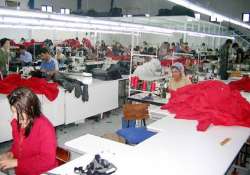Textile Exporters Flay Govt Move To Offer More Sops To Dhaka
Mumbai, Sep 2: The textile and apparel exporters today criticised the government move to accord special concessions to apparel imports from Bangladesh and termed the move as “ad-hoc and arbitrary.”The government today hinted at allowing

Mumbai, Sep 2: The textile and apparel exporters today criticised the government move to accord special concessions to apparel imports from Bangladesh and termed the move as “ad-hoc and arbitrary.”
The government today hinted at allowing its Eastern neighbour Bangladesh to export more duty-free garments into the country, ahead of Prime Minister Manmohan Singh's two-day visit to Dhaka next week.
“In April, we had raised the (duty-free) quota from 8 million pieces to 10 million...There is some more demand and the government will take a fair view on that,” Commerce and Industry Minister Anand Sharma said this morning in New Delhi.
When asked whether Dhaka has demanded more duty-free garment exports, Sharma said, “it is true that many of the tariff lines in the textiles sector are being discussed.”
Bangladesh is pitching for duty-free export of 61 textile items to India against 54 that are currently allowed. The textile and apparel exporters led by the Apparel Export Promotion Council (AEPC) and Clothing Manufacturers Association of India (CMAI) have flayed the government decision saying the move will spell disaster for the domestic industry in the absence of any reciprocal benefit for it.
“This is really going to spell disaster for us because Bangladesh is our largest competitor in the export markets. Giving them free access to our market is going to put jobs of million workers and businesses of thousands of small and medium enterprises at stake,” AEPC chairman Premal Udani told PTI here.
Udani also pointed out that the apparel and textile industry is dominated (85 percent) by the small and medium enterprises, and the move will significantly impact the domestic players.
“Never in the history of any trade negotiations such an accelerated process of concessions have been given to anyone. The domestic industry was willing to remove 14 items from the negative list. But an abrupt removal of 48 items, which comprise nearly 85 percent of our imports from Bangladesh, will severely dent apparel manufacturing activity in the country,” Udani added.
He also noted that most of the items are covered under the tariff rate quota (TRQ) given to Bangladesh, under which duty-free imports of these items are allowed up to 10 million pieces. This is a substantial increase from the 8 million pieces negotiated in 2007.
The Clothing Manufacturers Association of India (CMAI) also agreed with AEPC saying it is incredible that the government is not considering the potential impact on the employment scenario by encouraging imports and not promoting more domestic production.
“Even by conservative estimates, the likely imports of USD 2.5 billion per year could result in a loss of nearly 1.25 million jobs here,” CMAI President Rahul Mehta said.
“The industry had agreed to an increase in the TRQs, but removal of items from the negative list will open floodgates of Bangladeshi imports. Also, the duty-free imports of apparel translate to significant loss to the domestic fabric industry,” Udani pointed out. PTI